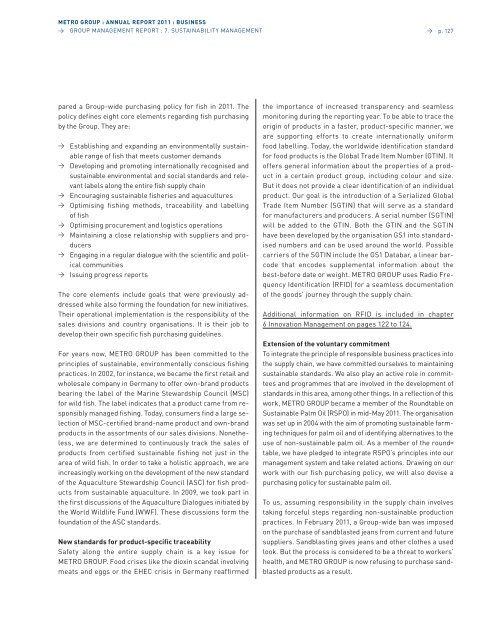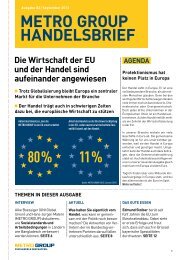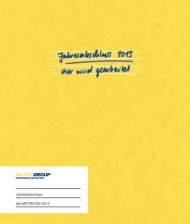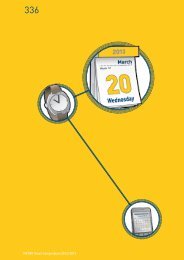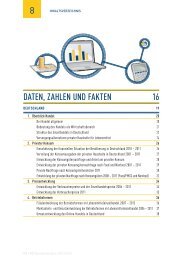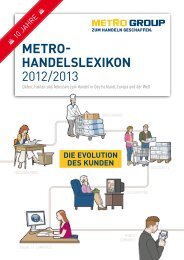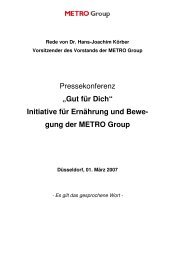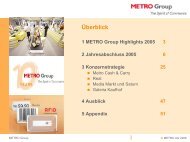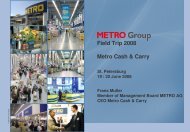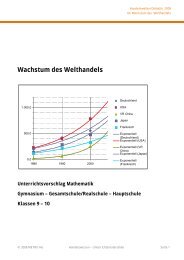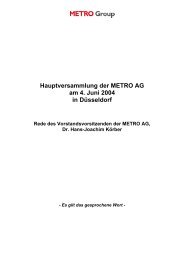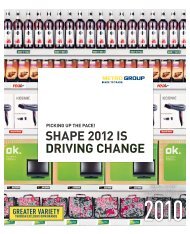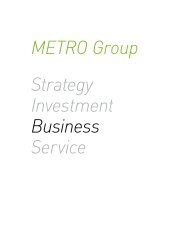pdf (22.8 MB) - METRO Group
pdf (22.8 MB) - METRO Group
pdf (22.8 MB) - METRO Group
Create successful ePaper yourself
Turn your PDF publications into a flip-book with our unique Google optimized e-Paper software.
<strong>METRO</strong> GROUP : ANNUAL REPORT 2011 : BUSINESS<br />
→ GROUP MANAGEMENT REPORT : 7. SUSTAiNAbiliTy MANAGEMENT<br />
pared a <strong>Group</strong>-wide purchasing policy for fish in 2011. The<br />
policy defines eight core elements regarding fish purchasing<br />
by the <strong>Group</strong>. They are:<br />
→ establishing and expanding an environmentally sustainable<br />
range of fish that meets customer demands<br />
→ Developing and promoting internationally recognised and<br />
sustainable environmental and social standards and relevant<br />
labels along the entire fish supply chain<br />
→ encouraging sustainable fisheries and aquacultures<br />
→ optimising fishing methods, traceability and labelling<br />
of fish<br />
→ optimising procurement and logistics operations<br />
→ Maintaining a close relationship with suppliers and producers<br />
→ engaging in a regular dialogue with the scientific and political<br />
communities<br />
→ Issuing progress reports<br />
The core elements include goals that were previously addressed<br />
while also forming the foundation for new initiatives.<br />
Their operational implementation is the responsibility of the<br />
sales divisions and country organisations. It is their job to<br />
develop their own specific fish purchasing guidelines.<br />
For years now, MeTRo GRoUp has been committed to the<br />
principles of sustainable, environmentally conscious fishing<br />
practices. In 2002, for instance, we became the first retail and<br />
wholesale company in Germany to offer own-brand products<br />
bearing the label of the Marine stewardship Council (MsC)<br />
for wild fish. The label indicates that a product came from responsibly<br />
managed fishing. Today, consumers find a large selection<br />
of MsC-certified brand-name product and own-brand<br />
products in the assortments of our sales divisions. nonetheless,<br />
we are determined to continuously track the sales of<br />
products from certified sustainable fishing not just in the<br />
area of wild fish. In order to take a holistic approach, we are<br />
increasingly working on the development of the new standard<br />
of the aquaculture stewardship Council (asC) for fish products<br />
from sustainable aquaculture. In 2009, we took part in<br />
the first discussions of the aquaculture Dialogues initiated by<br />
the World Wildlife Fund (WWF). These discussions form the<br />
foundation of the asC standards.<br />
New standards for product-specific traceability<br />
safety along the entire supply chain is a key issue for<br />
MeTRo GRoUp. Food crises like the dioxin scandal involving<br />
meats and eggs or the eHeC crisis in Germany reaffirmed<br />
→ p. 127<br />
the importance of increased transparency and seamless<br />
monitoring during the reporting year. To be able to trace the<br />
origin of products in a faster, product-specific manner, we<br />
are supporting efforts to create internationally uniform<br />
food labelling. Today, the worldwide identification standard<br />
for food products is the Global Trade Item number (GTIn). It<br />
offers general information about the properties of a product<br />
in a certain product group, including colour and size.<br />
But it does not provide a clear identification of an individual<br />
product. our goal is the introduction of a serialized Global<br />
Trade Item number (sGTIn) that will serve as a standard<br />
for manufacturers and producers. a serial number (sGTIn)<br />
will be added to the GTIn. Both the GTIn and the sGTIn<br />
have been developed by the organisation Gs1 into standardised<br />
numbers and can be used around the world. possible<br />
carriers of the sGTIn include the Gs1 Databar, a linear barcode<br />
that encodes supplemental information about the<br />
best-before date or weight. MeTRo GRoUp uses Radio Frequency<br />
Identification (RFID) for a seamless documentation<br />
of the goods’ journey through the supply chain.<br />
additional information on RFID is included in chapter<br />
6 Innovation Management on pages 122 to 124.<br />
Extension of the voluntary commitment<br />
To integrate the principle of responsible business practices into<br />
the supply chain, we have committed ourselves to maintaining<br />
sustainable standards. We also play an active role in committees<br />
and programmes that are involved in the development of<br />
standards in this area, among other things. In a reflection of this<br />
work, MeTRo GRoUp became a member of the Roundtable on<br />
sustainable palm oil (Rspo) in mid-May 2011. The organisation<br />
was set up in 2004 with the aim of promoting sustainable farming<br />
techniques for palm oil and of identifying alternatives to the<br />
use of non-sustainable palm oil. as a member of the round<br />
table, we have pledged to integrate Rspo’s principles into our<br />
management system and take related actions. Drawing on our<br />
work with our fish purchasing policy, we will also devise a<br />
purchasing policy for sustainable palm oil.<br />
To us, assuming responsibility in the supply chain involves<br />
taking forceful steps regarding non-sustainable production<br />
practices. In February 2011, a <strong>Group</strong>-wide ban was imposed<br />
on the purchase of sandblasted jeans from current and future<br />
suppliers. sandblasting gives jeans and other clothes a used<br />
look. But the process is considered to be a threat to workers’<br />
health, and MeTRo GRoUp is now refusing to purchase sandblasted<br />
products as a result.


